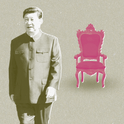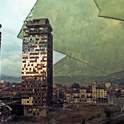Karachi is Pakistan's most chaotic city, and its largely immigrant population tends to view both the lung-clogging traffic and the occasional bouts of political violence as civic realities that should be acknowledged, accepted, then ignored. But there was no chance of that with the events surrounding one local figure's homecoming last Thursday. An explosive attack on the convoy of former prime minister Benazir Bhutto left more than 130 of her supporters and protectors dead, and many more of those thronging her vehicle maimed and bloody.
The months of speculation about Bhutto's return to Pakistan's political fray, after eight years of self-enforced exile, ended at Dubai International Airport's gate 21. Bhutto arrived on a small cart usually reserved for disabled passengers. She dismounted slowly, hugged her two young daughters while the cameras flashed away and her husband Asif Zardari looked on with a grin. "We'll also be returning to Pakistan quite soon," he said, as his wife left her family behind. She swept through the press pack jamming the departure lounge, and boarded the first-class cabin of Emirates Air's flight 606.
I had wangled a seat on board the plane as part of an assignment for a US television station, and so was ushered past the officious-looking men in uniforms who lined the aircraft's entrance. Meanwhile, wire-service photographers filed last-minute images from miniature laptops balanced precariously on their forearms; sound engineers coiled up red microphone cables and Lucas, a blue-eyed Australian air steward from Brisbane, struggled to seat excitable members of Bhutto's Pakistan People's party before take-off.
As the plane climbed steeply over the Arabian sea, chants of "Benazir" and "Bhutto" rang out from her supporters flying in economy class. A large poster of a haggard-looking Bhutto was raised across the left-hand aisle, and "Fasten Seatbelt" signs went ignored. Lucas met the growing mêlée with raised eyebrows and a weary smile.
Bhutto eventually appeared at the doorway of economy class, while television camera crews wrestled for her attention and photographers climbed over seats to get the best close-up. A small buck-toothed man paraded down the opposite aisle displaying a poster-size photo of himself. The image seemed to show Bhutto passing him by as she charged across a hotel lobby. She did much the same on board.
Victoria Schofield, an old friend of Bhutto's from their days studying together at Oxford, appeared unperturbed by the pandemonium around her as she read Jodi Picoult's novel "Mercy." "My daughter gave it to me as something distracting for the journey," she explained.
Suddenly, tussles between Bhutto supporters and members of the media escalated, and tempers frayed. "If you don't sit down, we'll turn around to Dubai," screamed a stewardess. "This is not a joke." "Seatbelt sir, seatbelt, seatbelt, seatbelt," yelled another at the jostling hordes. Moments later, the PA system crackled to life. "Thank you for choosing Emirates," intoned a Captain Parry, announcing flight EK606's descent to Karachi. "For those returning to Pakistan after a long absence, I wish you a safe and enjoyable time."
And it was enjoyable, at least for the next few hours. Bhutto exited the plane brandishing a copy of the Koran, before being bundled into a waiting minivan. An hour later, an elevator system carried her atop a specially designed bus with a bulletproof seating area. As the vehicle left the airport, thousands of PPP members surrounded their leader, waving flags and chanting slogans. It was slow progress for much of the afternoon: a dozen flat-bottom trucks bristled with camera tripods, while police pick-ups carried armed men with dark blue caps, flak jackets and scowls.
As Urdu music blared from parked cars, men in white and blue shalwar kameez shouted with arms aloft, and young boys climbed roadside trees to get a better view. In the centre of this maelstrom was Bhutto, either waving from the front rail of her open-top bus—unprotected by the reinforced glass but surrounded by lackeys—or fielding endless press enquiries. "How are you feeling right now?" asked one Swedish reporter, "Are you worried for your safety?" quizzed the tall man from the BBC. The dozens of hacks looking for a soundbite had first been asked unceremoniously to scramble through the crowds and scale a 20-foot ladder at the rear.
By dusk the motorcade had inched only just beyond the airport's outskirts, and as the evening wore on the crowds swelled further, many supporters buzzing through the crush two or three to a motorbike, sometimes entire families with infants perched up front. Fireworks appeared through the exhaust fumes, and handfuls of pink rose petals were dropped from bridges festooned with "WELL COME HOME BENAZIR" hoardings. I stayed with the motorcade, staving off jet lag and hunger with chocolate biscuits and hot chai provided by friendly party workers.
One particularly loud blast sounded just ahead of me as the convoy halted at one of many bottlenecks. Khawaja Maqbool Mustafa, an agricultural landowner from Multan, some 500 miles to the northeast of Karachi, jumped out of the Toyota SUV we were sharing. "Do you think it was just a burst tyre?" he asked, stepping gingerly towards the sound of the explosion. Seconds later came his answer. As I opened the door with my video camera primed, a massive blast shook the trucks bunched immediately behind Bhutto's bus. Ghostly figures in white costumes began to run, screams and moans following in short succession. One man with blood-spattered legs and half a foot missing leaned against a motorbike, while Karachi's notoriously ineffective power grid meant streetlights cast just a faint orange glow for the emergency services—when they eventually arrived.
I fled, fearing another explosion. The first blast had sounded to me like a hand grenade, and had generated no shock wave where I had been sitting. But to judge by the bodies and the injuries on those limping away from Bhutto's vehicle, the second explosion had been a suicide attack like those so common in Iraq; the assailant's vest laden with the ball bearings that tear through human flesh.
The bombings were a horrific end to a day full of excitement and celebration, but to cynical observers came as no huge surprise. Bhutto had more than once been told there could be threats on her life were she to return to Pakistan. Even if the credibility of these threats was questionable, there was no denying that a huge public rally with just a handful of police was a security risk in a city as volatile as Karachi.
The events of October 18th were a gory reminder of Pakistan's instability. In the following days, claim and counter-claim over the attack's perpetrators played out on the front pages of newspapers across Pakistan and the wider world, underlining the conspiratorial nature of Pakistan's politics. A week later, no definitive identities or motives have been established.
Bookmark this page with: |










